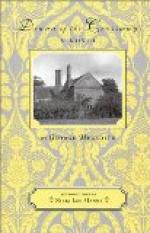She was happily away, borne by a whiter than swan’s wing on the sapphire Mediterranean. Her letters to Emma were peeps of splendour for the invalid: her way of life on board the yacht, and sketches of her host and hostess as lovers in wedlock on the other side of our perilous forties; sketches of the bays, the towns, the people-priests, dames, cavaliers, urchins, infants, shifting groups of supple southerners-flashed across the page like a web of silk, and were dashed off, redolent of herself, as lightly as the silvery spray of the blue waves she furrowed; telling, without allusions to the land behind her, that she had dipped in the wells of blissful oblivion. Emma Dunstane, as is usual with those who receive exhilarating correspondence from makers of books, condemned the authoress in comparison, and now first saw that she had the gift of writing. Only one cry: ‘Italy, Eden of exiles!’ betrayed the seeming of a moan. She wrote of her poet and others immediately. Thither had they fled; with adieu to England!
How many have waved the adieu! And it is England nourishing, England protecting them, England clothing them in the honours they wear. Only the posturing lower natures, on the level of their buskins, can pluck out the pocket-knife of sentimental spite to cut themselves loose from her at heart in earnest. The higher, bleed as they may, too pressingly feel their debt. Diana had the Celtic vivid sense of country. In England she was Irish, by hereditary, and by wilful opposition. Abroad, gazing along the waters, observing, comparing, reflecting, above all, reading of the struggles at home, the things done and attempted, her soul of generosity made her, though not less Irish, a daughter of Britain. It is at a distance that striving countries should be seen if we would have them in the pure idea; and this young woman of fervid mind, a reader of public speeches and speculator on the tides of politics (desirous, further, to feel herself rather more in the pure idea), began to yearn for England long before her term of holiday exile had ended. She had been flattered by her friend, her ‘wedded martyr at the stake,’ as she named him, to believe that she could exercise a judgement in politics—could think, even speak acutely, on public affairs. The reports of speeches delivered by the men she knew or knew of, set her thrilling; and she fancied the sensibility to be as independent of her sympathy with the orators as her political notions were sovereignty above a sex devoted to trifles, and the feelings of a woman who had gone through fire. She fancied it confidently, notwithstanding a peculiar intuition that the plunge into the nobler business of the world would be a haven of safety for a woman with blood and imagination, when writing to Emma: ’Mr. Redworth’s great success in Parliament is good in itself, whatever his views of present questions; and I do not heed them when I look to what may be done by a man of such power in striking at unjust laws,




